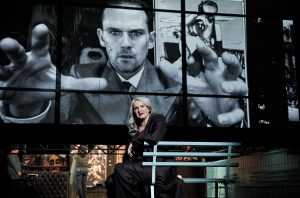The continuing success of right-wing populist parties and Trump’s presidency are worrying at best. Many people feel powerless, hoping that this situation will soon pass. Lion Feuchtwanger contemplated very similar problems in his trilogy Wartesaal (Waiting Room), which he wrote between 1930 and 1939. Feuchtwanger ‘s observations of national socialism in the 1930s were almost visionary and already entailed a theory of swarm intelligence, decades before this phenomenon was actually described.

Courtesy of Arno Declair.
Stefan Pucher, who directed TC Boyle’s novel América (Tortilla Curtain) at the Kammerspiele during the 2015/16 season, adapted Exil (Exile), the third part of Feuchtwanger’s trilogy, for the stage, together with dramaturg Tarun Kade and Malte Uebenauf. Exil, written in 1939, focuses on the situation of Germans living in exile in Paris in the mid-1930s. They exist in a kind of limbo, helpless, waiting for something to happen, wondering if this transitional stage will ever end.
Paris 1935. Bavarian composer Sepp Trautwein (Samouil Stoyanov) fled from the Nazis to Paris when Hitler came into power. When journalist Friedrich Benjamin (Jochen Noch), who works for the German publication “Pariser Nachrichten”, travels to Basel to meet with an informant, he asks Trautwein to take over for him until he gets back. But Benjamin is abducted by Nazi henchmen and taken to Germany. Trautwein uses the magazine to try and free Benjamin. Responsible for the abduction is Walther Reichsfreiherr von Gehrke aka “Spitzi” (Jan Bluthardt) who was in desperate need of CHF 30,000 for the complete reconstruction of his teeth by Jewish dentist Dr. Wohlgemuth (Stefan Merki) who is well on his way to London.
Trautwein’s antagonist is Erich Wiesener (Daniel Lommatzsch), editor of the “Westdeutsche Zeitung”, a Nazi propaganda publication in Paris. An intelligent and talented writer, Wiesener would much rather indulge in his research about Beaumarchais than deal with the idiocy and heavy-handedness of the Nazis. Wiesener has a relationship with Lea de Chassefierre (Julia Riedler), who is a quarter Jewish, which endangers his position within the Nazi hierarchy. Wiesener and Lea have a son together, Raoul de Chassefierre (Niklas Herbert Wetzel) who becomes increasingly critical of his father. When Wiesener receives a visit from Nazi bigshot Konrad Heydebregg (Jochen Noch) aka “Das Nilpferd” (the Hippopotamus), he is instructed to do whatever is necessary to stop the anti-Nazi propaganda by the irritating “Pariser Nachrichten”. The first step is getting rid of Sepp Trautwein.
Stefan Pucher and his cast of fifteen actors, playing twenty-three characters, create a wide panorama. Sepp Trautwein’s idealism and humanism is contrasted with the conviction of his son Hanns (Hassan Akkouch) that only violence offers a solution. Feuchtwanger’s characters are ambivalent. The positive characters such as Trautwein and Franz Heilbrunn (Stefan Merki), the editor in chief of the “Pariser Nachrichten”, are conflicted and filled with contradictions.
Pucher’s last production América (The Tortilla Curtain) dealt with an affluent society that was trying to keep emigrants out of their neighbourhood. This time he focuses on emigrants who wither away in their forced exile. The state of waiting is made palpable by Barbara Ehnes‘ stage design, a waiting room in a train station painted in a nasty green. The Nazis use their ample space freely and dominate it. When Konrad Heydebregg (Jochen Noch) appears for the first time, he immediately takes over the centre of the stage. The emigrants are forced into a small room on rails about five feet above the stage that serves as Trautwein’s flat and the editorial office. Poet Oscar Tschernigg (Gundars Āboliņš) lives in a small space beneath like an insect that might be trampled underfoot at any moment. Often the characters are cut in two but Ute Schall‘s black and white video projections enlarge them and make important scenes more intimate.
Their story is told by Annette Paulmann as the Narrator and also by the characters themselves, Pucher keeps his adaptation very close to Feuchtwanger’s text which means that the richness of the novel is transferred to the stage. There are many memorable scenes and one of the highlights is the story that an old man named Ringseis (Walter Hess) tells, regarding the word “ara” that was often used by Homer, meaning something like “as you can imagine”. He states that if we had thought about the real meaning of this word, some things might not have happened and predicts that future colleagues of Homer might write: “When they came into power, they seized, as you can imagine, all those who they did not love, tied them up, as you can imagine, beat them, squandered their property and took their dear lives.”
A timely and relevant production with rich characters that are played by an outstanding cast. It should not be missed! 5/5
Review written by Carolin Kopplin
Wartesaal will next be shown on Friday 5th January 2018. For more information on the production, visit here…


Leave a Comment